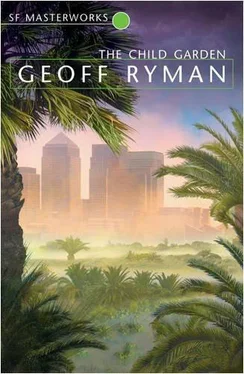Rolfa’s father was thinking that it was strange, that of all his children it should be Rolfa who ended up the most like him. Rolfa would have known the opera was there just to glorify the Squidges. She would have known it was more important to get on with work. It had been Rolfa who had invented the time sheets. Every hour a member of the Family worked was supposed to earn forty francs — four marks. This meant that every hour they did not work also cost four marks.
Rolfa’s father had become Consul of the Family after the Restoration. The Family called it the Emergency. The Squidges had metal of their own now.
Time is not money. Money is money. Money is a promise, nothing more, an agreement not to doubt. Money is, for example, an exchange of iron ore for promises. The Family were receiving fewer promises for their Antarctic iron, but the time sheets still said they were rich. That kept them happy. And money being nothing more than a promise, an abstract notion, the Family somehow managed to stay wealthy. Rolfa’s father sat with his whizzing machinery, looking at figures that were pure superstition. Like all superstitions, money was real. It was as real as the gods of ancient Sumer. The gods of Sumer were media of exchange as well — they presided over storehouses for goods. They also were agreements not to doubt. Gods collapse.
Zoe shook her head. ‘One of us ought to see it,’ she said. She was thinking of Rolfa, who could not see the Comedy, under the clear unshielded skies of Antarctica. She was thinking of Milena and the strangeness of life. ‘The little fish,’ Zoe murmured to herself.
Her father was busy with an account. Any system of accounting, whether it uses words or numbers, achieves meaning by what it leaves out. Her father’s account left out almost everything that interested Zoe. She and her father spoke in different tongues.
As Zoe turned away, a cat on the roof over her head slunk down the roof slates. A thin coating of cats moved all over London, some in mid-air leaping, others licking their feet in doorways, others hunched over bowls, eating. Some of them lay on their sides, cold, on the pavements.
Under the roof of the Family house, seven women and two men were cooking in various kitchens, chopping vegetables or staring at boiling pots without really seeing them. Downstairs, eight Polar teenagers watched their video, each costing the Family a notional two marks an hour. The time of teenagers was given half value.
In the houses on the other side of the street, a Party Woman was filing her toenails. Another was repairing seat covers. One couple made love, another fought, someone else was washing the leaves of her rubber tree. Outside in the street, two coffee vendors passed each other, pulling their wagons and tureens. One was on his way to Knightsbridge, the other was going home. They smiled and nodded to each other in good fellowship. There was good fellowship among those who plied the new trade, now that the public were safely addicted to caffeine. At the bottom of Rolfa’s street, where the terrace ended, there was a noisy main street full of traffic. A smelly omnibus dragged its low-hanging rear end past the corner, alcohol exhaust billowing up behind it. On the pavement, a woman covered her face with a scarf, to filter the fumes. A sun-blasted drunk was slumped in a doorway and he held up a bottle, saluting the woman in the twilight.
The shops on the corner were closing early. A plump, bald man, only nineteen years old, but afflicted with the signs of middle age, folded bamboo shutters over his windows. There was no night trade now, with the opera. He lived with other families in rooms above the shop. On the roof, the shopowner’s wife and his children and the What Does cousins were gathering setting up pears or tables, carrying basins of food, preparing a party.
Two miles away, along the river, fishermen were pulling in lines. There were bonfires on wasteground, where people were gathering to share the last night of the opera. In parks, bamboo platforms had been erected, onto which the Comedy was cubed when there was heavy cloud. Much of the Comedy had been obscured by cloud, but tonight, the sky was autumnal and clear. Even so, technicians were carrying out final checks on the equipment. Holograms of giant roses and human hands flickered in and out of existence. The platforms would serve if there was a sudden front of warm moist air. Overhead there were balloons which would see the advancing front of weather and give warning.
In Archbishop’s Park one of the workmen finished a bottle of beer. His head tilted backwards to receive the last drop, and overhead he saw the spangle of stars. Another workman was peeing half-seen behind a bush. A tug moved in the direction of St Thomas’s Hospital, with the current of the Thames. It swung up and down in the wash of a bigger barge. Lights from the hospital glowed.
In London’s two hundred and ninety-two hospitals over fifty women were in labour at that very moment. One of them bit her lip and pushed, and there was a sense of breakthrough, and the head of newborn was free. Another newborn was slapped, and began to wail. It began to wail, just as Zoe turned in the doorway; as the coffee vendors nodded; and as a laughing man in a pub seemed suddenly to slip and fall, knocking mugs from the counter. His heart had failed. In the kitchen of a kaff, near the Cut, amid a clatter of pots and pans, a twelve year old sharing in the cooking poured boiling water over herself. A man finished positioning his favourite stuffed chair in the middle of the street, to watch the show in the air. Three doors down a young man moved from one foot to another, nervously waiting for a girl he only partly knew.
It can’t be done. Now cannot be imagined or described, not all at once. We have to string it on a thread, in imitation of the way we view the past. In imitation of the way we view ourselves. If you try to tell the whole truth, you never stop talking. And so we tell stories, histories, instead.
‘Time is money,’ said Rolfa’s father.
‘Who were you today?’ Mike Stone asked gently.
Milena was sitting on the balcony of her hospital suite. There were no sharp corners in the hospital suite. It was made of Coral and had grown like flesh. The floor of the balcony flowed upwards to make a wall. The top of the wall rose and fell with a line as natural as that of a tree branch. The walls were covered with plaster because the Coral could sting.
The Coral had chewed up rubble from the older buildings of St Thomas’s Hospital and laid it in genetically-determined patterns. Milena’s genetic balcony looked over the Thames. There were moored barges strung with lights and full of people. The windows of the West were full of people. The West was a sandy-coloured swelling of Coral where the Houses of Parliament had once been, across the river.
Below was the embankment pathway that Rolfa and Milena had walked along on their last day together. Milena remembered looking up at the hospital then. Now she was here, ill, and the wide pavements of that walkway were filled with Bees. They sat in respectful silence, looking up at her. Oh well, thought Milena, leave them be, it’s the last night of the Comedy.
The souvenirs of her life were scattered about her. There were not many. There was her attempt to orchestrate the Comedy. It was bound in a notebook. Music by Rolfa Patel said the first sheet. Orchestrated by Milena Shibush. There was a dirty lump of felt invested with personality called Piglet. There were Rolfa’s papers, and some Coral jewellery that Mike had bought for her. There was the paper Cilia had given her, and the music that Jacob the Postperson had remembered. In a box of earth on the wall, mere were herbs. They had been grown out of the wall of the Bulge and Mike had brought them home. They were dying.
Читать дальше












